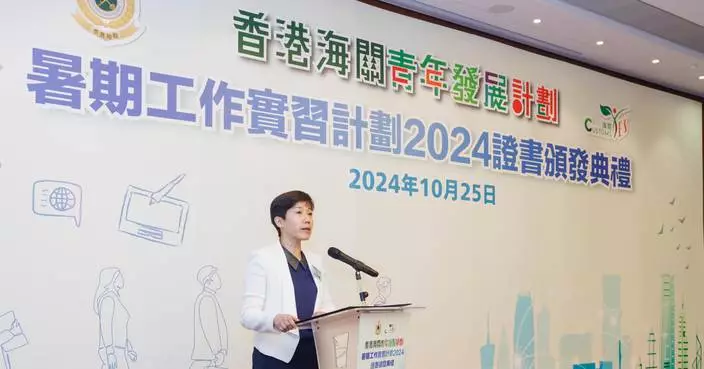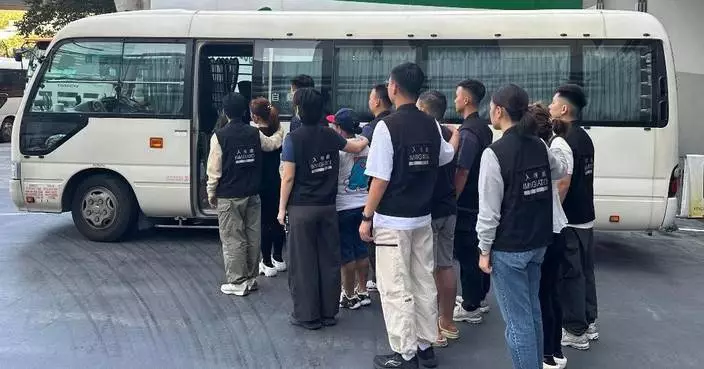Speech by DCS at Save the Children Hong Kong's 15th Anniversary Dinner
Following is the speech by the Deputy Secretary for Administration, Mr Cheuk Wing-hing, atSave the Children Hong Kong's 15th Anniversary Dinner tonight (October 25):
Paul (Chairman, Save the Children Hong Kong, Mr Paul Kennedy), Donnie (the Ambassador of Save the Children Hong Kong, Mr Donnie Yen), Cissy(spouse of Mr Donnie Yen, Ms Cissy Wang), distinguished guests, ladies and gentlemen,
Good evening. It is my great pleasure to join you all to celebrate the 15th anniversary of Save the Children Hong Kong.
First, I would like to extend my heartfelt appreciation to Save the Children for its sustained efforts and unwavering dedication in working with children, schools, families and different stakeholders to deliver lasting change for children in Hong Kong and around the world. I am truly impressed that, just last year alone, programmes of Save the Children have benefited over 26 000 Hong Kong children and adults. Save the Children's vision is a world in which every child attains the right to survival, protection, development and participation. This meaningful and noble cause deserves the wholehearted support of all.
The Government attaches great importance to protecting the best interests of children and firmly believes that every child has a right to protection against harm and abuse. In this regard, the Mandatory Reporting of Child Abuse Ordinance was passed in July this year, requiring professionals in the social welfare, education and healthcare sectors to report serious child abuse case starting from January 20, 2026. During the 18-month transitional period, the Government will focus on preparing for its implementation, ensuring that the various support measures are properly put in place. The new legislation is an important milestone in child protection, as it would create a wide protection web for children and send a strong deterrent to potential perpetrators that their abuse will be easily exposed.
One way to prevent child abuse is to strengthen positive parenting. I am glad to see that Save the Children has been organising the Heart-to-Heart Parent-Child Programme which promotes positive parenting and strengthens parent-child relationships, with 500 children and parents benefitting from the Programme. On the part of the Government, the 2024 Policy Address has just announced that a pilot scheme will be launched to set up four Community Parents and Children Centres, which will commence service from 2026, to promote parent-child interaction and pass on positive parenting skills to parents through play-based services. The Centres will also support the cognitive, language, social and emotional developmental needs of children and refer families or children in need to various government and community services as appropriate.
To promote children's mental health, the Government has implemented various measures, including extending and enhancing the Three-Tier School-based Emergency Mechanism in all secondary schools; launching the "Mental Health Literacy" resource packages for senior secondary and lower primary students; strengthening teachers' capacity to early identify and support students with mental health needs; and helping parents acquire the knowledge and skills to better safeguard their children's mental health. I am pleased that Save the Children shares the same vision with the Government, in providing various mental wellness programmes, such as the "Play to Thrive Programme" and the Integrating Social and Emotional Learning into Schools project. I trust Save the Children will continue to work hand in hand with the Government and different sectors of society to strive for children's healthy growth and development.
I sincerely hope that everyone in this room will continue to lend their support to children's issues by actively building cross-sector partnerships. These collaborations are essential for creating a more impactful and sustainable approach to address the challenges faced by children in our community. Together, we can "nurture hearts and strengthen minds" of our children, providing an environment where they feel supported and empowered.
Once again, my congratulations and gratitude to Save the Children for its 15 years of commitment and achievements. I wish Save the Children continuous success and every one of you a wonderful evening.

Speech by DCS at Save the Children Hong Kong's 15th Anniversary Dinner Source: HKSAR Government Press Releases

Speech by DCS at Save the Children Hong Kong's 15th Anniversary Dinner Source: HKSAR Government Press Releases
Employers and employees should make prior work arrangements in times of tropical cyclones and rainstorms
As the Strong Wind Signal No. 3 (T3) is now in force, the Labour Department (LD) today (October 26) reminded employers to make prior work arrangements for employees during and after tropical cyclone warnings, rainstorm warnings and "extreme conditions", including arrangements on reporting for duty, release from work, resumption of work and remote work (if applicable). These arrangements not only can ensure the safety of employees and smooth operation of establishments, but also are conducive to maintaining good labour-management relations.
"In drawing up and implementing the work arrangements and contingency measures for periods during and after tropical cyclone warnings and rainstorm warnings, employers should give prime consideration to employees' safety and the feasibility of employees travelling to and from their workplaces. Employers should also give consideration as much as possible to the different situations faced by individual employees, such as their place of residence and the road and traffic conditions in the vicinity, and adopt a sympathetic and flexible approach with due regard to their actual difficulties and needs," an LD spokesman said.
To avoid misunderstanding, disputes and confusion, employers should consult and engage employees when drawing up the arrangements and make appropriate updates or amendments based on the experience of each occasion and the needs of both employers and employees, as well as the actual situations. The work arrangements should cover the following matters:
* arrangements in respect of reporting for duty;
* arrangements in respect of early release from work;
* arrangements in respect of resumption of work (e.g. the number of hours within which employees should resume duty after the warning concerned is cancelled or when "extreme conditions" comes to an end, and when safety and traffic conditions allow);
* arrangements in respect of remote work such as work from home (if applicable) (e.g. duty and work arrangements during and after tropical cyclone warnings, rainstorm warnings or "extreme conditions");
* arrangements regarding working hours, wages and allowances (e.g. calculation of wages and allowances in respect of reporting for duty and absence); and
* special arrangements in respect of staff required to report for duty in times of adverse weather and "extreme conditions".
"Employers should conduct a timely and realistic assessment of whether there is any need for requiring staff to report for duty at workplaces when a tropical cyclone warning, rainstorm warning or 'extreme conditions' is in force. In making the assessment, employers should take into account the safety of employees, the business nature, operational needs and urgency of service, with due regard to the manpower requirements, staffing establishment and individual situations of employees, and keep the number of staff at workplaces to the minimum as far as possible," the spokesman added.
When a Pre-No. 8 Special Announcement is issued during working hours, employers should release employees from workplaces or from work in stages or arrange for them to work remotely as soon as practicable. To ensure the safety of employees and to enable them to arrive home before suspension of public transport services, employees who have mobility problems (for example, pregnant employees or those with a disability), employees who rely on transport services which are prone to being affected by adverse weather conditions (for example, ferry services) to get home, and those who work in or are living in remote areas (for example, outlying islands) should be given priority to leave. Other employees should be released from workplaces or from work in stages according to their travelling distance or the time required for returning home.
If an Amber, Red or Black Rainstorm Warning Signal is issued during working hours, employees working indoors should continue to work as usual unless it is dangerous to do so. Supervisors of employees working outdoors or in exposed areas should suspend outdoor duties as soon as practicable. They should arrange for their employees to take shelter temporarily and resume duty only when weather conditions permit. If the Black Rainstorm Warning Signal is still in force by the end of working hours, employees should stay in a safe place until the heavy rain has passed. A suitable area in the workplace should be made available by employers as temporary shelter for employees.
If it is necessary for employees to report for duty at workplaces under adverse weather or "extreme conditions", employers should discuss and agree with them in advance on the duty arrangements and contingency measures. If public transport services are suspended or limited when Tropical Cyclone Warning Signal No. 8 (T8) or higher, Black Rainstorm Warning Signal or "extreme conditions" is in force, employers should provide safe transport services for employees travelling to and from workplaces, or grant them an extra travelling allowance.
The spokesman also reminded employers to observe the statutory liabilities and requirements under the Employment Ordinance, Occupational Safety and Health Ordinance, Factories and Industrial Undertakings Ordinance, Employees' Compensation Ordinance and Minimum Wage Ordinance.
"As natural calamities cannot be avoided, for employees who are not able to report for duty or resume work on time due to adverse weather or 'extreme conditions', employers should neither deduct their wages, good attendance bonuses or allowances, nor reduce employees' entitlement to annual leave, statutory holidays or rest days under the Employment Ordinance, or ask for additional hours of work from employees to compensate for the loss of working hours when they are unable to report for duty," he said.
Employers should note that they have an obligation to provide and maintain a safe working environment for their employees under the Occupational Safety and Health Ordinance. If employees are required to work in times of tropical cyclone warnings, rainstorm warnings or "extreme conditions", employers should ensure that the risks at work are reduced as far as reasonably practicable. Moreover, under the Employees' Compensation Ordinance, employers are liable to pay compensation for injuries or deaths incurred when employees are travelling by a direct route from their residence to their workplace, or from their workplace back to their residence after work, four hours before or after working hours on a day when T8 or higher, a Red or Black Rainstorm Warning Signal or "extreme conditions" is in force.
The LD has published the "Code of Practice in Times of Adverse Weather and 'Extreme Conditions'", which provides the major principles, reference guidelines and information on relevant legislation on making work arrangements for the reference of employers and employees. The booklet can be obtained from branch offices of the Labour Relations Division or downloaded from the department's webpage (www.labour.gov.hk/eng/public/wcp/Rainstorm.pdf).











